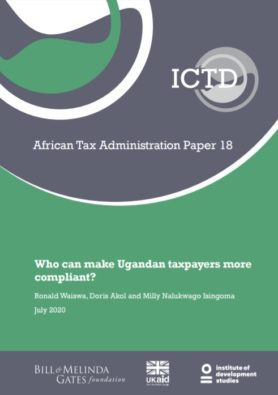African Tax Administration Paper 18
The rate of occurrence of tax evasion is higher in Uganda than in the rest of East Africa. Where the taxpayer has latitude to decide whether or not to be compliant, as in the case of income taxes, Ugandans seem to be less compliant than other East Africans. Uganda collects less in domestic taxes than other countries in the region. For revenue, the Ugandan government depends more on customs duties, on taxes that are difficult to dodge, notably Withholding Tax, and on taxes where there are in-built incentives to comply, such as Value Added Tax (VAT). The framework for improving tax compliance consists of three broad channels: making it easier for taxpayers to comply (facilitation), enforcement and increasing trust (in the government, in its spending practices, and in the tax collection agency itself). Using this framework, we discuss the measures that have been adopted by the Uganda Revenue Authority (URA) and the Government of Uganda, the successes achieved and the gaps that remain. The URA is best placed for facilitation. It also plays a major role in enforcement, although its efforts may be either supported or undermined by the government and politicians. The URA can do little to increase trust in the government in general; that is principally a job for the government. The URA can mainly make itself more trustworthy in the eyes of taxpayers by being transparent and minimising corruption. We find that URA has been successful in facilitating tax compliance, although there are opportunities for improvements on its current initiatives. The URA’s enforcement actions are, however, weak and limited. To a large extent, they have been undermined by the government and politicians. Enforcement has also been weak, due to internal URA factors, such as the understaffing of the enforcement team and the fact that the URA does not take enforcement action as often on small taxpayers. Lastly, very little has been done to build taxpayer morale. There are widespread concerns over the poor use of tax money, missing or poor government services and some sections of society being shielded from paying their share, because of their connections or roles in government. The URA is also not highly trusted and corruption is still a major problem among tax collectors. To build trust in the government, the URA is undertaking some of the tasks of justifying tax collection that would normally be undertaken by another part of government. There is a lot of scope for both the government and URA to gain more trust from the taxpayer. Improving tax compliance in Uganda will require the government (in the sense of the executive) and the URA to work more together. The government should give more support to URA activities, desist from protecting non-compliant taxpayers and be accountable to the public for the revenues collected. The URA needs to improve its trust-building initiatives and address some internal weaknesses.

